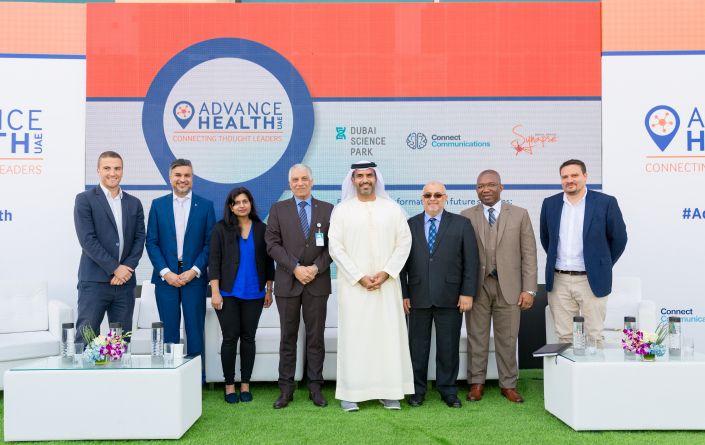Dubai Science Park (DSP), a science and healthcare-focused business community, brought together leading experts to discuss the merits and challenges of public and private healthcare systems with the aim of determining which model works best for patients, medical services providers and the economy. The significant discussions took place as part of the sixth edition of DSP’s Advance Health forum, a networking platform that convenes key healthcare stakeholders in the UAE to explore crucial industry topics.
DSP organised the event in partnership with Synapse Medical Services, a healthcare administration company, and Connect Communications, a strategic healthcare communications agency, under the theme ‘Health Systems: Who Pays for Health?’. The agenda featured talks by Mihtab Osman, Health Economist at the Dubai Health Authority, Margaret Faux, CEO of Synapse Medical Services, Kandarp Thakkar, Chief Pharmacist at King’s College Hospital London, Joe Hawayek, Middle East Director at AETNA, and Stephan Stauffer, General Manager of Arabian Ethicals.
Healthcare is arguably one of the biggest global industries, with expenditures expected to rise to USD $10.059 trillion by 2022. The world’s most developed countries have each taken a unique approach to healthcare that is specific to their needs, with some relying on governments as single payers, some turning to private insurers and others using a two-tier system. Over the years, there have been countless innovations in the industry, however, experts have yet to reach a consensus on what works best. This is because each system represents an innate set of values. For example, some countries, like the US, place a greater emphasis on driving innovation that has the potential to benefit the rest of the world, while in other countries, the primary goal is to ensure adequate coverage for underprivileged segments of society.
These issues are especially relevant to the UAE, whose healthcare sector is poised to grow to AED103 billion by 2021. The domestic market is becoming increasingly sophisticated and speciality-focused due to higher awareness among citizens and residents as well as the growing interest in medical tourism. As per the Medical Tourism Index 2016, the latest edition of the biennial report available to date, Dubai was ranked 16thglobally and first in the MENA region. In 2016, the emirate welcomed 325,000 medical tourists and plans to increase this number to 500,000 by 2020, representing a compound annual growth rate (CAGR) of 11.3 per cent.
Marwan Abdulaziz Janahi, Managing Director of Dubai Science Park and Chairing Member of the Pharmaceuticals and Medical Equipment Taskforce of the Dubai Industrial Strategy 2030, said: “The past 10 years have seen a surge in the demand for healthcare services in the UAE, spurred by rising population growth, the government’s efforts to create investor-friendly environments, such as specialised free zones, and the introduction of mandatory health insurance. The UAE leadership’s significant investments in the local healthcare system have already started bearing fruit, with Dubai continuing to strengthen its position as a medical tourism destination.”
He added: “As the UAE strives to become a hub for healthcare services, forums such as this one will become increasingly important. It is critical that we engage leading specialists to identify solutions that will benefit us all. The experts we heard from today concurred on one point – that there is room for improvement. Ultimately, today’s talk was merely the beginning of the conversation, not the end.”
The country’s healthcare system was ranked 10th in the world for efficiency in 2018, ahead of Norway, Switzerland, Canada and the US. With the life expectancy of UAE residents registering 77.1 years and healthcare expenditure estimated at 3.5 per cent of the GDP, the UAE is fast becoming a model for best-in-class healthcare.
Thom Soutter, Business Development Director at Synapse Medical Services, said: “We were delighted to bring the latest in the Advance Health series, with this session focusing on the financing of healthcare systems from a local and global perspective. We explored all areas of the market and what collaboration should be required in the future to ensure that more healthcare spend can be allocated to the most important aspects of any developing healthcare system – preventative and curative treatment. We thank the members of our network for attending and look forward to seeing them at the next event.”
Dubai Science Park regularly convenes leading industry events dedicated to the science, healthcare, energy and environment sectors. Previous editions of the Advance Health forum covered important subjects such as telemedicine and disease prevention.
